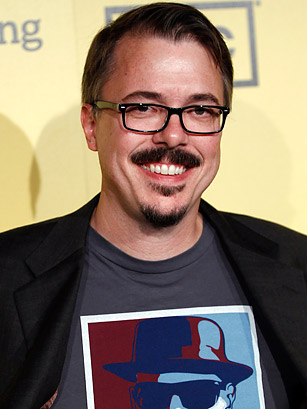
Walter White (Bryan Cranston) is the sort of criminal whose neighbors would never suspect him: quiet, family guy, keeps to himself. Which makes it fitting, in a way, that his story — high-school chemistry teacher gets cancer and becomes a crystal meth cooker to secure his family's future — should be told by a writer like Vince Gilligan. In interviews, the Breaking Bad creator, 44, is exceedingly polite, with the kind of soft Virginia accent for which the word "courtly" was invented. Yet from his mind spring figures of bone-chilling and banal evil, like Gus Fring (Giancarlo Esposito), a fastidious but ruthless drug kingpin posing as a fast-food-chicken entrepreneur. In its spectacular fourth season, Breaking Bad continued Walter's descent from conflicted family man to arrogant criminal mastermind, a journey all the more harrowing because he began it very much like one of us and still sees himself as a good man. "To me it's an interesting bit of human behavior that we don't recognize ourselves for who we truly are," Gilligan says. "Most of us have a bit of a rose-colored view of who we are and our place in the world." As Gilligan's TV epic teaches us, sometimes it's the quiet ones you've got to watch out for.